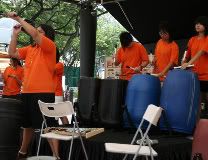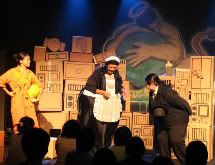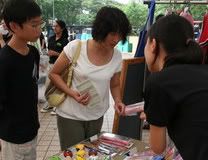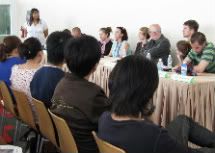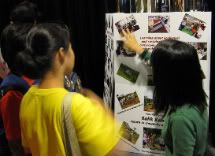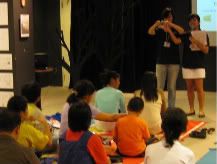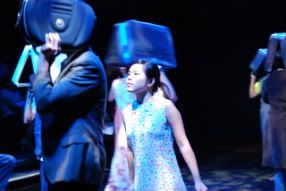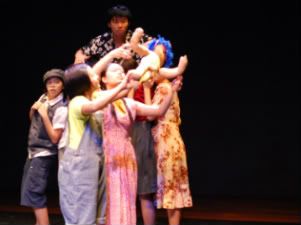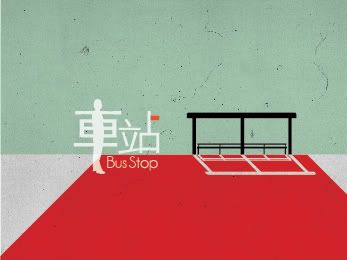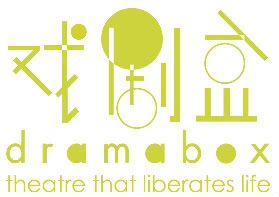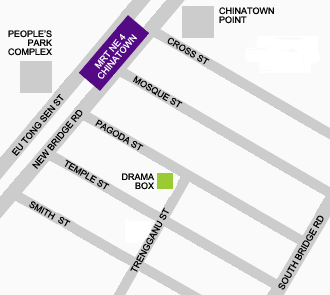2008年7月26日
The Power Of Community 社区的力量 & The Greening of Cuba
The Power Of Community:
Cubans share how they transitioned from a highly mechanized, industrial agricultural system to one using organic methods of farming and local, urban gardens after they lost global support in the early 1990's.
It is an unusual look into the Cuban culture during this economic crisis, which they call "The Special Period."
Cuba, the only country that has faced such a crisis – the massive reduction of fossil fuels – is an example of options and hope.
古巴启示录:在九十年代頭經歷蘇聯解體、美國禁運制裁,石油的供應絕無僅有。古巴人向全世界展現了在「石油供應」緊張下人類可持續發展的方向。包括城市規劃,有機農業,公共交通,再生能源開發……最重要的,是人與人之間,合作與希望的故事。
The Greening Of Cuba:
When trade relations with the socialist bloc collapsed in 1990, Cuba lost 80 percent of its pesticide and fertilizer imports and half its petroleum--the mainstays of its highly industrialized agriculture. Challenged with growing food for 11 million in the face of the continuing US embargo, Cuba embarked on the largest conversion to organic farming ever attempted.
Told in the voices of the women and men--the campesino, researchers, and organic gardeners--who are leading the organic agriculture movement, The Greening of Cuba reminds us that developed and developing nations alike can choose a healthier environment and still feed their people.
8th August, 7pm-9:30pm
*scape Youth Centre (opp cineleisure)
Discussion facilitator: Mr Tay Lai Hock
limited seating capacity, email ARTivate@dramabox.org now to secure seats!
2008年7月19日
august movie screening
Date / Time: 1st Aug / 7pm - 9:30pm
Venue: *scape (Lab)
Facilitator: Mr. Danny Yeo 杨君伟 & Myra Loke (ARTivator)
Limited seats available, Book now at admin.ARTivate@gmail.com
2008年7月14日
'What Matters?' 备忘录
艺树人(ARTivate) 的‘WHAT MATTERS?' 计划在约一个礼拜前刚刚圆满落幕。身为统筹的我,终于可以松口气了。
五月到七月,艺树人举办了两个座谈会,一个电影播映节目兼分享会,还有最后压轴的学生论坛剧场演出。整个‘WHAT MATTERS?’ 计划讨论和关心的是和种族社群有关系的课题。两个月下来,我一边在进行统筹的工作,一边参加这些活动,获益不浅。
先提参与活动时学到的东西和感想,然后才说进行统筹工作的经验和过程。
‘WHAT MATTERS?’ 的第一个节目请来了 Dr Lai Ah Eng 和 Mr Farid来为我们讲解在学校与现代社会里的种族歧视和刻板化 (stereotypes) 的情况以及所牵涉到的一些问题。Dr Lai 以非常简单而有效的方式来讲解在学校里的种族问题。原来不只是学生,连老师和校长也会歧视某些种族的人或是对某些种族的人存有刻板印象。一位学校的校长竟然以‘不够马来人’为由而不成立足球队,听了令人惊讶。一般人这么想也就算了,博学多闻的人也这么说,我不能接受。况且,身为管理学校的校长以种族肤色来做某些决定,可能会影响到学生,实在不能鼓励。Mr Farid和我们进行游戏,从中和大家一起分析,讨论和了解一些大家对某些族群拥有的刻板印象和它们的真实性或准确性。游戏让大家打起精神来,也让我们认识了一些不同族群或文化的朋友。
一个礼拜后,我们播映了电影‘To Kill a Mockingbird’。这部影片取自于 Harper Lee 所写的同名小说,讲述的是美国三十年代的一位白人律师辩护一个被指控强奸的黑人。小说广受好评和大众的喜爱,还赢得美国文学界的最高荣誉‘Putlizer Prize’。电影也拍的很好,赢得了几项美国奥斯卡电影大奖。
这两个节目都让我摄取到一点。种族歧视是会死人的。有时候,会死很多人。印尼人在八十到九十年代经济不景气的时候都觉得所有印尼华侨狡猾会做生意,非常有钱,并认为是外来华侨抢走了他们的赚钱机会使他们穷困的。因此,印尼人开始对华侨使用暴力,造成无辜死伤。
六月份,很荣幸请到一位波斯尼亚籍的导演 Mr Haris Pasovic 和他的演员来讲解波斯尼亚人(Bosnians)和塞尔维亚人(Serbs) 的纷争。Mr Pasovic 和他的众多演员是应新加坡艺术节的邀请而来新加坡演出一部名为‘CLASS ENEMY’ 的舞台剧。大家都说非常好看,只可惜没能买到票。
座谈会上,波斯尼亚来的朋友都分享了在这场种族之间的战争所受到的影响。记得波斯尼亚和塞尔维亚人开打的时候,我才中学二年级,还不知事情的严重和来龙去脉,只知道有人打仗,而北约组织以武力介入,停止这场战争。现在亲耳听到这些经历过种族纷争和战争的人,才彻底了解为什么新加坡政府这么畏惧种族纷乱,也完全明白政府严厉惩处公开歧视其他种族的人。
战争是可怕的。它对人们所造成的影响是没有办法估计与衡量的。其中一个波斯尼亚演员说了一句令我印象深刻的话。‘For me, the war is not over.' 战争已经平息多年了,到现在还是无法忘怀,可见阴影有多么大。
为肤色,语言,种族政治大动干戈,真的毫无逻辑,对我来说也毫无意义。
最后一项节目就是在滨海艺术中心做论坛剧场的演出。演出有六场,我看了两场完整的。在看演出的当儿,Hui Ling 提到了一个很重要的问题,一时间让我茅塞顿开。到底我们是要‘忍受’(tolerate)其他族群的人还是要‘接受’(accept) 他们?我想大家都应该好好的想想,我们日常生活中对其他的社群到底抱有什么样的态度。到底是‘忍受’还是‘忍受’?哪一种做法才能比较容易和不同语言和文化的人生活在同一个空间里头?
对我来说,是后者。
完成了这次统筹的工作,又学会了一些新的东西,和我平常在做舞台剧所学的东西稍微有点不同。过程中虽然有时候会有错误,虽然会挨骂,可是这些都是小事。被人骂就是学习。哈哈!
中国古代很多伟人常常说若要成事,天时地利人和缺一不可。我坚信这个道理。
其实身为统筹,因为主要工作就是协调个部门使工程顺利运作,管的是人,所以我觉得人和为首。一个大工程你一个人再能干是没有用的。要大家的合作,才能成功。剧场也是这个道理。
在演出的特刊里,写了这么一段话:
'As the project leader, how much you can do is really secondary. To get people to do things, to get people to do things on time and to get things done the way you need it to be done, THAT MATTERS!'
哈哈。你是否英雄所见略同呢?
这次做起事来是蛮轻松又顺意的。这都要归功于‘What Matters?’ 背后的一群能人在帮忙。
我本来想一个一个谢的。可是参与计划的人实在太多了。我怕得罪人。所以:
‘谢谢大家!’:-)
(累积了三个月的话,终于全部吐出。哈哈!谢谢阅读!)
2008年7月13日
Theatre of the Oppressed
As Forum Theatre is 1 of the main basis of our works here in ARTivate, I would like to share with you more info about Theatre of the Oppressed, the umbrella in which Forum Theatre is under.http://www.theatreoftheoppressed.org/

Quoting Boal from the site:
Theatre of the Oppressed was born in 1971, in Brazil, under the very young form of Newspaper Theatre , with the specific goal of dealing with local problems – soon, it was used all over the country. Forum Theatre came into being in Peru, in 1973, as part of a Literacy Program; we thought it would be good only for South America– now it is practiced in more than 70 countries. Growing up, TO developed Invisible Theatre in Argentina, as political activity, and Image Theatre to establish dialogue among Indigenous Nations and Spanish descendants, in Colombia, Venezuela, Mexico... Now these forms are being used in all kinds of dialogues.
In Europe, TO expanded and the Rainbow of Desire came into being – first to understand psychological problems, later even to create characters in any play. Back in Brazil, the Legislative Theatre was born to help the Desire of the population to become Law – which it did at last 13 times. Right now, the Subjunctive Theatre is coming slowly into being.
We discovered that all those forms, independently where they had been created, could be developed and used all around the world, because they are simply a Human Language.
TO was used by peasants and workers; later, by teachers and students; now, also by artists, social workers, psychotherapists, NGOs... At first, in small, almost clandestine places. Now in the streets, schools, churches, trade-unions, regular theatres, prisons...
Theatre of the Oppressed is the Game of Dialogue: we play and learn together. All kinds of Games must have Discipline - clear rules that we must follow. At the same time, Games have absolute need of creativity and Freedom. TO is the perfect synthesis between the antithetic Discipline and Freedom. Without Discipline, there is no Social Life; without Freedom, there is no Life.
The Discipline of our Game is our belief that we that we must re-establish the right of everyone to exist in dignity. We believe that all of us are more, and much better, than what we think we are. We believe in solidarity.
Our Freedom is to invent ways to help to humanize Humanity, freely invading all fields of human activities: social, pedagogical, political, artistic... Theatre is a Language and so it can be used to speak about all human concerns, not to be limited to theatre itself.
We believe in Peace, not in Passivity!
Above all, we believe that the Theatre of the Oppressed is of, about, by and for the Oppressed, as it is clear in our Declaration of Principles. If you agree with this, we certainly agree with you.

Augusto Boal, Rio de Janeiro 2004
Please visit the site to read up more about Forum Theatre and Theatre of the Oppressed.
http://www.theatreoftheoppressed.org/en/index.php?nodeID=3
a.khL
2008年7月11日
What Matters Theme Song
finally learnt how to upload a song onto blogger! so tho What Matters has ended, here's the theme song.Guo Quan, our ARTivator who's in-charge of Sponsorship, composed What Matters' Theme Song
Into Their World
Song & Lyrics by Guo Quan
Sticks and stones may break our bones
But words break our soul
Loneliness is hard to bear
Admist a crowd of men
Why we hurt each other so?
Are we that great?
Maybe we all forgot
How to love another man
We're so different in many ways
Yet the same blood flows within us
Take a little time and sit with them
Go into their world, go into their world
You will see, we're not so different after all
We all cry, we all laugh, we all ('re the same)
The colours of the rainbow
The coat of many colours
The flowers in the field
They're beautiful
We're beautiful if we stand together
Take a listen :)
剧本导读系列之一 《漂移》
忙完了 What Matters?, 立刻跳进艺树人的‘种植’工作;剧本导读系列 。在这系列里,ARTivators需要读上十部著作。
7月5日我们讨论了第一个剧本:〈漂移〉
以下是雪梅对呈现方式的分析:
演员与人物之间的关系
在分配角色方面,《漂移》选择让四位演员分饰剧中的几个人物 —— 杜文德、杜昌明和王先生都是由周野芒演出;梁茵玲、倩倩和芸芸都是由秦旋饰演;Victor和 Gerald由林继修饰演;杜慧瑛、女人和林愫芬则由郭沛珊演出。同时,演员们也扮演着“漫游者”的角色,在特定的时候脱离所饰演的人物,转为“叙述”故事和人物心声的“漫游者”。
剧中存在着两个世界 —— 漫游者的世界以及现实世界。安排演员分饰剧中人物和“漫游者”的角色划分了这两个世界,同时也将这两个世界之间的界线模糊了。演员们在穿梭于“漫游者”和人物之间的肢体动作表现得干净利落,很明显地让观众看出他们什么时候是在扮演“漫游者”,什么时候是在扮演人物。这使两个世界有了明确的划分。然而,人物和“漫游者”都是同一个演员扮演,似乎又是隐喻生活中的我们经常在这两个世界中漂移,一下子投入我们的生活、一下子却跳脱自身来“看”自己,来为自己的行为作解释、跟自己对话。
同时,安排同一个演员以“漫游者”的身份叙述人物的心情在某种程度上也让观众直接的了解人物的个性和内心的感受。“漫游者”让人物有机会和自己对话,这似乎蛮符合剧中人物不断寻找自己的主题。剧中,我们看到人物和“漫游者”之间的“沟通”,从而体会到人物寻找自己的过程。在漫游者-沛珊和慧瑛的“对话”中,我们可以看到她如何为自己创作一首属于自己的歌曲。在漫游者-继修和Victor的“对话”中,我们可以看到Victor是如何从一开始自认为王者到最后迷失自己的过程。在漫游者-秦旋和芸芸的“对话”中,我们可以看到芸芸到后来如何认清自己在社会上的价值。在漫游者-继修和Gerald的“对话”中,我们可以看到Gerald如何到了最后看清自己以后的路只能孤独地走下去。
选择让周野芒饰演杜文德、杜昌明和王先生这三个角色,我认为是因为这三人之间的关系以及他们各自所散发的“Chinese-ness”的不同。杜文德是杜昌明的儿子,而王先生是杜文德的妻子的第二任丈夫。三个人所包含的“Chinese-ness”都不同 ——杜文德的“Chinese-ness”体现于他对“家”和“承诺”的坚守。他感觉上虽然对茵玲有好感,但是仍然不让自己“出轨”,即便他的妻子已经40年没有音讯。因此,他才会对Victor说出“我累了,我懂得回家。”这句话。此外,他对于与妻子愫芬的约定也铭记在心。杜昌明的“Chinese-ness”是表现在他听从父亲的意思,和自己毫无感情的女人结了婚。因此他的“Chinese-ness”体现于他对于婚姻是“父母之命,媒妁之言”的信念。王先生则将他的“Chinese-ness”体现在他对愫芬的敬爱,并且非常保护愫芬的贞节,一再向慧瑛解释,希望她不会误解愫芬。他对于男女关系的保守展现了他的“Chinese-ness”。让同一个演员来扮演这三个拥有不同“Chinese-ness”的角色,很明显地对比出三人的不同。因为是同一个演员在演,所以观众更容易从他的肢体、语气、表情等,看出他三个演出中的不同,从而也看出三个人物的分别,甚至是三个人物的一些共同之处。
同样的,让一个演员同时扮演Victor和Gerald这对父子可以让观众去思考两个同样不说华语的人的“Chinese-ness”有何异同。Victor的“Chinese-ness”体现在他对“家”这个概念的坚持;Gerald的“Chinese-ness”则是受到外在因素激起的,非常短暂和不稳定。
在《漂移》中也出现一个似有似无的人物 —— 景观人。剧本上说“景观人仿佛就是失去灵魂的人物躯体”。其实, 我认为这个景观人可以有各种象征性。他/她可以说是整个戏的“中心点”。我认为在观众入席时,他/她站在悬在半空中的平台上就已经为这个戏营造了“漂移”的感觉。感觉上,他/她就像杜文德说的“面无表情”、“就像是半空中看这座城市”。在戏里,所有的演员都绕着他/她,他/她却不受其影响,默默地参与了整出戏。其实,我还在思考并想办法参透这个人物的意义,因此也许没有办法说得很详尽。
互动式媒体
对于戏里所运用的互动式媒体,我认为用得很恰当。戏里运用了互动式媒体来配合剧中所说的“我们赶路的速度太快了,快到灵魂远远落在后面。如果不停下脚步,灵魂就跟不上了”。类似这样的互动式媒体可以营造贴切剧本主题的视觉效果。
舞美设计
此外,我也认为《漂移》的舞美设计极为符合剧本的主题。因为有这样的舞美设计,演员看起来总是绕着圈子走。这似乎和剧本的概念有些相似。愫芬的“Chinese-ness”由她开始,却留了一部分给慧瑛、茵玲和王先生,形成了一种“cycle”。Victor总是以为自己是王者,兜了一个圈,才发现自己原来可能只是那只被杀的鹿。
2008年7月7日
Born Into Brothels
这是昨晚在 Arts Central 看了一部非常好的纪录片。也是 ARTivate 还是在 Youth Incubator 时代,我们一行人想在上映时去看的一部戏。
那时很遗憾的,没看成。
Born into Brothels, by Ross Kauffman and Zana Briski, is the winner of the 77th annual Academy Award for Best Documentary Feature. A tribute to the resiliency of childhood and the restorative power of art, Born into Brothels is a portrait of several unforgettable children who live in the red light district of Calcutta, where their mothers work as prostitutes. Zana Briski, a New York-based photographer, gives each of the children a camera and teaches them to look at the world with new eyes.
一直以来都想把摄影防进我的工作里,可能是时候了吧。
2008年7月4日
Solar Taxi

For the first time in history, a solar-powered car is driving around
the world without any carbon emissions. Swiss adventurer Louis Palmer
is taking a small blue environmentally-friendly taxi around the world.
The solar-electric two-seat taxi with attached trailer is an attempt to
call attention to global warming while providing solutions for oil
independency.
With a full component of batteries, the Solar Taxi has an autonomy of
almost 200 miles. With additional energy from the solar cells on a
sunny day, it can travel almost 260 miles. The vehicle has a top speed
of 60 miles an hour and needs no gasoline at all.
By the time the Solar Taxi travels the Earth, it will have been to 40
different countries upon five continents, including the United States.
Read more about this project at http://www.solartaxi.com/mission/.

2008年7月2日
MODERNisation
最近为了寻找写剧本的灵感,脑子里不断思考一些奇奇怪怪的问题。很想听听大家的意见和看法,所以在这里留下一道问题:是社会把人性现代化了?还是人性把社会现代化了?
是因为社会发展速度太快,才让人变得现实?
亦或者是人原本就存在的人性,促使我们一再改变这个社会,让它能够变成我们理想中的社会?
Recently, in the process of seeking inspiration for a script which I am working on, my mind constantly reflected on several issues and questions. I am curious about people's opinions, hence I leave a question on this blog entry:
Is society responsible for changing or "modernising" the human mindset? Or was the human mindset the deciding factor which drove us to change the society to one which suits our wants?


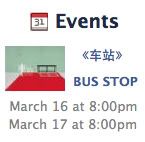
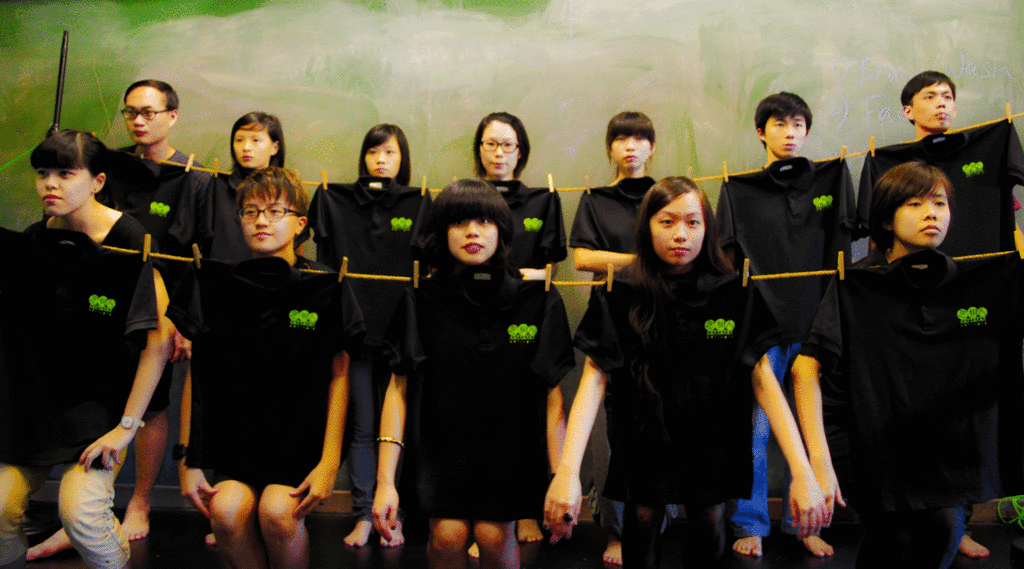
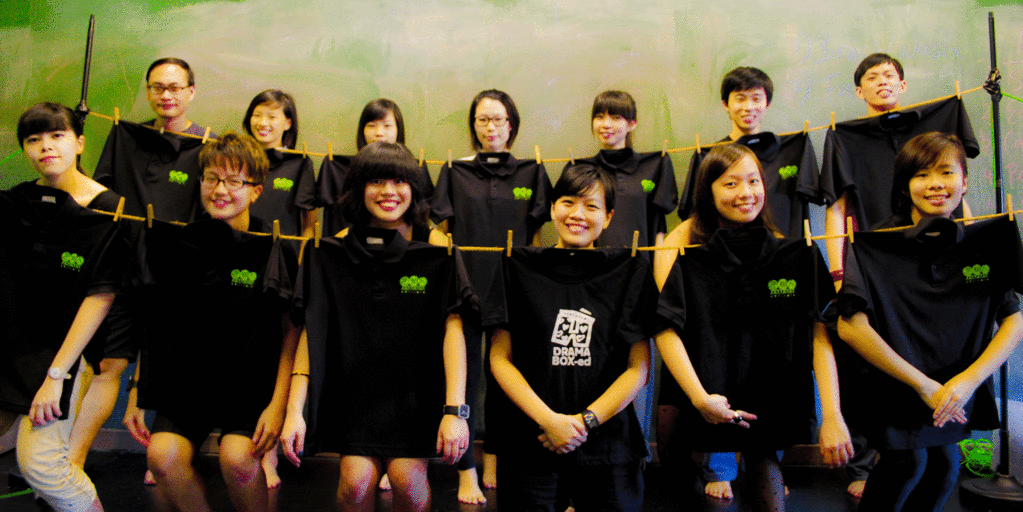
 母性泛滥; 热爱人
母性泛滥; 热爱人 长着翅膀
长着翅膀 我在南大念心理学科。心理学对我来说,跟戏剧的妙处不相上下。
我在南大念心理学科。心理学对我来说,跟戏剧的妙处不相上下。 就读南洋理工大学。
就读南洋理工大学。 法律系学生。
法律系学生。 正值后青春期的门槛状态。
正值后青春期的门槛状态。 热爱的东西太多,拥有的时间有限。
热爱的东西太多,拥有的时间有限。 在国大读书.
在国大读书. 南大中文系毕业。非常健忘,经常丢三落四。
南大中文系毕业。非常健忘,经常丢三落四。 在2009年毕业于新加坡国立大学的科学系。由于我目前还在学习编剧和导戏的工作,未能有值得一提的代表作。
在2009年毕业于新加坡国立大学的科学系。由于我目前还在学习编剧和导戏的工作,未能有值得一提的代表作。 爱与剧场牵手,与社会学接吻。
爱与剧场牵手,与社会学接吻。 艺树人面试那一天,我告诉许慧铃:"其实我想要做的是电影。"
艺树人面试那一天,我告诉许慧铃:"其实我想要做的是电影。" 